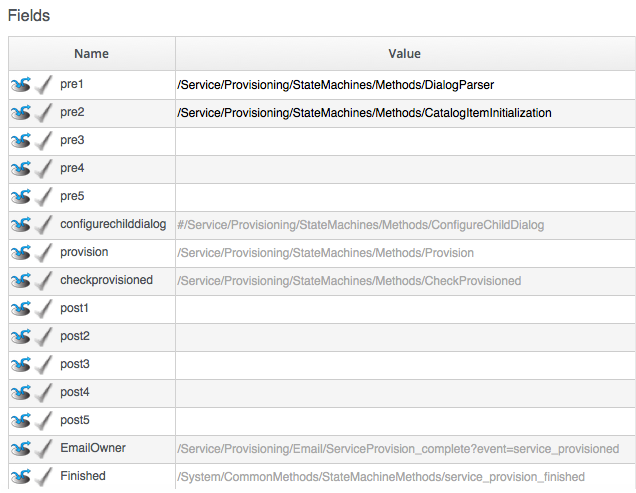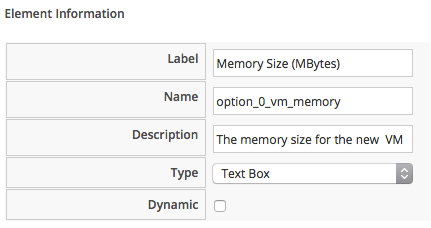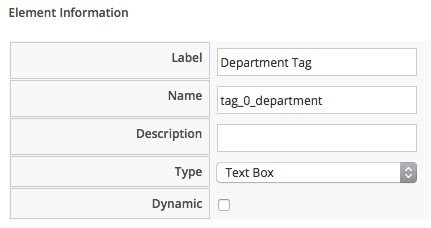Catalog{Item,Bundle}Initialization
Two of the out-of-the-box Service Provisioning State Machines are CatalogItemInitialization and CatalogBundleInitialization. They have been created to simplify the process of creating full-featured Service Catalog Items and Bundles, fronted by rich service dialogs, without the need for any Ruby scripting.
These two State Machine Instances, and their supporting Methods, have been completely re-written for ManageIQ Botvinnik (CloudForms Management Engine 5.4). We will discuss the use of the CatalogItemInitialization Instance in detail in this section.
CatalogItemInitialization
The CatalogItemInitialization State Machine can be specified when we create a Service Catalog Item, i.e. an orderable entry in the Service Catalog that provisions a single type of VM (although it may result in multiple VMs of the same type being provisioned).
The State Machine greatly simplifies the process of customising the provisioned VMs, using values read from the service dialog. It does this by setting options_hash values or tags in the child and grandchild miq_request_task objects, from specially constructed service dialog element names. It also allows us to specify a new unique name and description for the resulting Service.
The schema for the CatalogItemInitialization Instance is as follows:

We can see that the schema uses the pre1 and pre2 states to add a dialog parser (common between the CatalogItemInitialization and CatalogBundleInitialization State Machines), and the CatalogItemInitialization Method to set the child object options_hash values and/or tags accordingly.
The CatalogItemInitialization Method itself relies on the dialog inputs having been parsed correctly by dialog_parser, and this requires us to use a 'standard' naming convention for our service dialog elements.
Service Dialog Element Naming Convention
To perform the service dialog -> options_hash or tag substitution correctly, we must name our service dialog elements in a particular way, depending on whether the element is requesting input for a single option or tag, or a comma-separated list (array) of options or tags.
Single Option
The simplest service dialog element to process is one that prompts for the value of a single options_hash key. We name the service dialog element as:
option_0_key_name (for backwards compatibility with CloudForms Management Engine 5.3)
or just
key_name (valid for CloudForms Management Engine 5.4 and later)
For example if we create a service dialog element as follows:

The resulting value input at run-time will be will be propagated to the child task's options hash as:
miq_request_task.options[:vm_memory]
The '0' in the dialog name refers to the item sequence number when provisioning. For a service dialog fronting a single catalog Item this will always be zero. For a service dialog fronting a catalog Bundle comprising several Items, the sequence number indicates which of the component Items the dialog option should be passed to (an element with a name sequence of '0' will be propagated to all Items).
Several key_name values are recognised and special-cased by the CatalogItemInitialization Method. We can name a text box element as either vm_name or vm_target_name, and the resulting text string input value will be propagated to all of:
miq_request_task.options[:vm_target_name]
miq_request_task.options[:vm_target_hostname]
miq_request_task.options[:vm_name]
miq_request_task.options[:linux_host_name]
If we name a text box element as service_name, then the resulting service will be named from the text value of this element.
If we name a text box element as service_description, then the resulting service description will be updated from the text value of this element.
Single Tag
We can also create a text box service dialog element to apply a single tag. We name the service dialog element as:
tag_0_tag_category
For example:

The value input into the service dialog element at run-time should be a tag within this tag category. When an element of this type is processed by the CatalogItemInitialization Method, if either the category or tag don't currently exist, they will be created.
CatalogBundleInitialization
The CatalogBundleInitialization State Machine should be specified when we create a Service Catalog Bundle.
The schema for the CatalogBundleInitialization Instance is the same as for CatalogItemInitialization, except that the pre2 stage calls the CatalogBundleInitialization Method.
The CatalogBundleInitialization Method passes the service dialog element values on to each catalog item's CatalogItemInitialization Method, which is still required in order to set the miq_request_task's options hash keys for the provision of that catalog item.